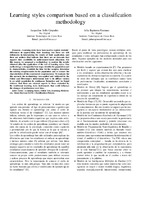Mostrar el registro sencillo del ítem
Learning styles comparison based on a classification methodology
| dc.contributor.author | Solís-Céspedes, Jacqueline | |
| dc.contributor.author | Espinoza-Guzmán, Julia | |
| dc.date.accessioned | 2018-06-14T20:40:18Z | |
| dc.date.available | 2018-06-14T20:40:18Z | |
| dc.date.issued | 2017 | |
| dc.identifier | https://ieeexplore.ieee.org/document/8120894/ | es |
| dc.identifier.citation | J. Solís-Céspedes and J. Espinoza-Guzman, "Learning styles comparison based on a classification methodology," 2017 Twelfth Latin American Conference on Learning Technologies (LACLO), La Plata, 2017, pp. 1-7. doi: 10.1109/LACLO.2017.8120894 | es |
| dc.identifier.uri | https://hdl.handle.net/2238/9800 | |
| dc.description | © © 2017 IEEE. Personal use of this material is permitted. Permission from IEEE must be obtained for all other uses, in any current or future media, including reprinting/republishing this material for advertising or promotional purposes, creating new collective works, for resale or redistribution to servers or lists, or reuse of any copyrighted component of this work in other works. | es |
| dc.description.abstract | Learning styles have been used to explain students’ differences in approaching their learning, but there are still deficiencies in interpreting the results of their application, and there are authors that indicate that there are no elements that support their credibility in achievement-based education. For this reason, we proposed a methodology to analyze the results obtained after the application of the test of learning styles. Our methodology is designed in four steps: identify the population and its characteristics, establish the time for the samples, determine the existing conglomerates in the population and to extract the characteristics of the constructed conglomerates. To evaluate the this aproach, the methodology was applied and validated by the Felder and Silverman’s dichotomous test vs its diffuse version in an adult population in continuous formation and we found evidence that there are external aspects to those evaluated by the traditional learning styles instruments that could influence the changes of preferences over time. | es |
| dc.language.iso | spa | es |
| dc.publisher | IEEE | es |
| dc.relation.hasversion | 10.1109/LACLO.2017.8120894 | es |
| dc.rights | acceso abierto | es |
| dc.subject | Aprendizaje | es |
| dc.subject | Sociología | es |
| dc.subject | Correo | es |
| dc.subject | Irrigación | es |
| dc.subject | Visualización | es |
| dc.title | Learning styles comparison based on a classification methodology | es |
| dc.type | presentación de congreso | es |
Ficheros en el ítem
Este ítem aparece en la(s) siguiente(s) colección(ones)
-
Artículos [29]
Artículos en otras revistas


